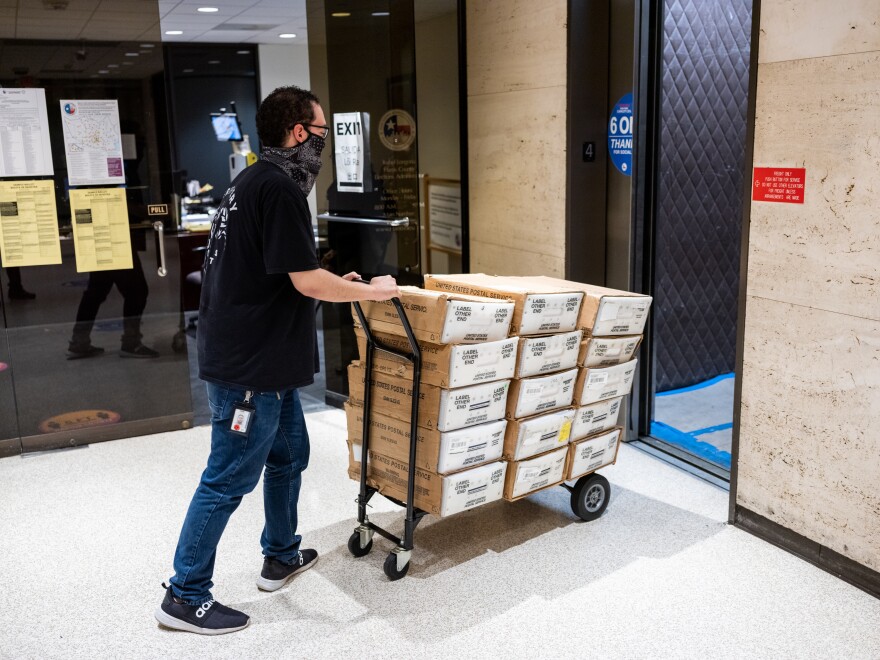Thousands of Texas voters had their mail ballots rejected in this month's primary, after the state's controversial new voting law created additional ID requirements.
Local election officials say the new identification requirements as a result of the Republican-backed law tripped up many eligible voters in the March 1 primary.
An Associated Press analysis released Wednesday afternoon found that a total of nearly 23,000 mail ballots were rejected across the majority of Texas' counties.
Perhaps most notably, in Harris County — home to Houston, and the state's most populous county — officials said they rejected a whopping 19% percent of the mail ballots they received, or 6,888 mail ballots in total.
During the primary election in 2018, the county had only rejected 135 mail ballots out of more than 48,000, election officials said in a statement. That's less than 0.3%.
But the issues were widespread, as final figures have come out. In Williamson County — a historically Republican suburban county north of Austin that's been turning blue in the past few years — officials there rejected 11.5% of returned mail ballots.
Chris Davis, the county's elections administrator, said he has "never seen this number [of rejections] before." He said in past elections, rejection rates were usually in the "low single digits."
Davis says there are clear reasons why the rejection rate spiked this year.
"The most common reason in my county's case — and talking to my colleagues in other counties — was the lack of proper identification numbers or ID number issues with that ballot," he said.
What tripped up voters
Under Texas' new voting law, known as Senate Bill 1, voters have to provide a partial Social Security number or driver's license number on their mail ballot application — as well as on the return envelope. And the ID number they provide has to match what's on their voter registration record, which could be from decades ago.
Davis said this new requirement tripped up an unprecedented number of voters. He and his staff helped many of them fix their ballots, but some voters did not fix their ballot in time to be counted.
"So many of those folks didn't have a chance, either because there wasn't enough time or because they had given up," he said. "We encountered some folks who had given up and said, 'Forget it, I have too many other things going on in my life.' "
Besides issues with matching ID numbers, there was also a big issue with voters flat out missing the ID portion of their ballot's return envelope. The ID field was located under the envelope flap, which Davis said is easy to miss.
"The design of the envelope is problematic, in my opinion," he said, "given that there are a lot people that don't give a second thought to something that is obscured upon sealing and mailing."
The Texas secretary of state's office said this was a problem across the state.
"Based on what we have heard from county election officials, the vast majority of mail-in ballot rejections were due to voters who did not provide any ID information on their carrier envelope," Sam Taylor, assistant secretary of state for communications, said in a statement.
Davis says he understands the reason behind the ballot's design is the need to shield personally identifiable information.
"But the flipside of that was that this is an area of a document, or of an envelope, that lots of voters didn't pay much attention to," he said. "And that was precisely the area they needed to pay attention to."
"It created havoc"
Hani Mirza, the voting rights program director at the Texas Civil Rights Project, said far too many voters were disenfranchised in the primary because of changes made to the state's vote-by-mail program.
"These are more than enough votes to swing state and local elections," he said. "We are talking about a number of votes that is incredibly troubling."
Mirza says the high ballot rejection rates should raise questions about whether Texas' primary even counts as a democratic election.
"You can't throw out that many ballots based on a technicality that was a part of a very convoluted process and say that the process was democratic," he said.
And voting groups say the people most affected by these changes were older and disabled voters. (Texas limits who can vote by mail.)
Grace Chimene, president of the League of Women Voters in Texas, says the law made things difficult for people who were already used to voting a certain way.
"It created havoc where you didn't have havoc before," she said. "People were used to voting by mail and now it has become a hurdle."
Chimene says her group is going to come up with some advice for state and local elections officials on how to better communicate new ID rules to voters.
"We want to make sure that we do ... the best we can with the law that we have in place for the next elections," she said. "And then we want to improve this law in the future."
Taylor said in a statement that the Texas secretary of state's office is planning to step up voter education efforts ahead of the general election in November to enhance "awareness of the new mail-in ballot ID requirements."
"We are confident we have the data and research we need to apply any lessons learned during the primary to an even more robust voter education campaign heading into the November General Election," Taylor said in the statement.
Copyright 2024 KUT 90.5


